I’ll admit it. I liked “Across the Sea.” I thought it was pretty neat.
…And 75% of the audience for this post just walked out the door. That’s cool. Those of you who stayed, let’s talk.
How do we judge a piece of art? It’s a question we at Overthinking It have struggled with since our inception, and it’s a question I personally end up rethinking every time I have an opinion that runs counter to the popular consensus.
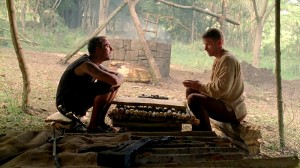 How do we judge a piece of art? Most people, I think, tend to instinctively follow the criteria outlined in Aristotle’s Poetics. According to Aristotle, drama is made up of six parts: mythos (plot), ethos (character), dianoia (thought – or, in modern terms, theme), lexis (diction – or, in modern terms, dialogue and acting), melos (melody – or, in modern terms, soundtrack), and opsis (spectacle – in modern terms, special effects, sets, and costumes). A good drama will include good versions of all six elements: a good plot, good characters, good themes, good dialogue, etc.
How do we judge a piece of art? Most people, I think, tend to instinctively follow the criteria outlined in Aristotle’s Poetics. According to Aristotle, drama is made up of six parts: mythos (plot), ethos (character), dianoia (thought – or, in modern terms, theme), lexis (diction – or, in modern terms, dialogue and acting), melos (melody – or, in modern terms, soundtrack), and opsis (spectacle – in modern terms, special effects, sets, and costumes). A good drama will include good versions of all six elements: a good plot, good characters, good themes, good dialogue, etc.
But what do we mean by “good”? And what do we mean by “bad”? I know these questions sound annoyingly academic, but they were the questions I found myself asking as I read everyone’s reactions to “Across the Sea.” “Holy crap, that episode was BAD!” “Jumped the shark! Worse than Bai Ling BAD!” “God, the dialogue was so BAD!” “The glowy cave effects were BAD!” “And what about the acting? BAD!” “Seriously. WORST. EPISODE. EVER.”
The unspoken notion underlying these comments is that everyone agrees on what bad acting, bad dialogue, bad characterization, and so on look like. And the assumption underlying that notion is that there is and can only be one definition of good acting, good dialogue, good characterization, and so on.
In this piece, I’m going to propose a different way of judging a piece of drama. I’m not going to ask you to like “Across the Sea,” but I am going to ask that you look at it from a different angle. If you still dislike it from that angle, sure, that’s your prerogative. It wasn’t a perfect episode by any stretch of the imagination. But I am going to ask you to consider, if not accept, that maybe the decisions in this episode were made purposefully to create a piece of art that would work on its own terms, if not the audience’s.
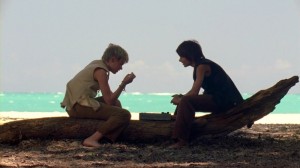
Roger Ebert often says that he judges movies against the best in their genre, not against each other. That’s why he can give Escape from L.A. three-and-a-half out of four stars and Amistad only three stars. He’s not saying Escape from L.A. is better than Amistad, because he’s not comparing Escape from L.A. to Amistad. He’s comparing Escape from L.A. to Die Hard and Predator and The Rock. He’s comparing Amistad to Glory and Gone With the Wind and Schindler’s List.
Ebert’s not alone on this. Northrop Frye, the less-well-known-than-he-should-be literary critic also believed that pieces of art should be judged based on how well they worked as an example of a certain “mode” of literature. Frye outlines two different modal theories. In one, different types of dramas are distinguished from one another based on the relationship of the protagonist to the audience. The five modes are:
MYTH: In which the hero is a divine being.
ROMANCE: In which the hero is a human being, but his actions are “marvelous.” (Think: superhero.)
HIGH MIMESIS: In which the hero is superior in degree to the audience. (Think: kings and queens and knights and so on. They’re not super-heroic, but they’re written as “better” or more emotive than we normies are.)
LOW MIMESIS: In which the hero is just like us. (Think: “realism.”)
IRONY: In which the hero is an object of mockery who is placed “below” the audience. (Think: grotesque caricatures.)
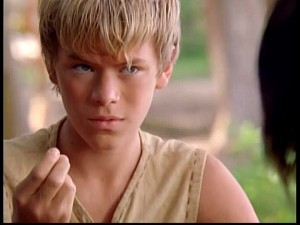
Frye also arranges stories based on their standard plots and tones. We have:
COMEDY: At the end, the protagonists are integrated into society (usually by getting married). The audience is meant to feel happy and “this is as things should be.”
ROMANCE: At the end, the protagonist forms a new society (usually by becoming king). The audience is meant to feel an “elegiac” feeling, a sense of beautiful loss, as the creation of a new society requires the dissolution of an old one (and a loss of innocence).
TRAGEDY: At the end, the protagonist is isolated from society (and usually dead). The audience is meant to feel catharsis and pathos.
SATIRE: At the end, the protagonist either runs away from his absurd/hellish society, or the protagonist is stuck in his absurd/hellish society forever. The audience is meant to feel cynical, detached, and sometimes somewhat hateful. We’re meant to have a “demonic epiphany” that we are stuck in a “prison of endless pain” or following a “quest that isn’t there.”
You can mix and match the five character modes with the four plot modes. For example, you could have a myth-tragedy, in which a god is destroyed by another god. Although Shakespearean and Greek tragedies tend to focus on high-mimetic characters like kings and queens, you could write a low-mimetic tragedy focusing on the fall of a regular dude (like Death of a Salesman). You could put an ironic character into a romantic plot and call it Don Quixote. And although satires tend to mock regular folk or the dregs of society, That’s My Bush and parodies of Shakespearean plays prove that high-mimetic characters can be taken down if placed in a satirical universe.
According to Frye, we can only criticize Lost once we know what mode it’s in. It’s not fair, after all, to judge a satire based on the standards of a tragedy, or vice versa. So where does Lost fit in? Is it a comedy, a tragedy, a romance, or a satire? Let’s look at the modes one at a time and figure this out.
COMEDY: Well, it’s definitely not a comedy we’re watching. Lost clearly isn’t a story of people trying to integrate into society; it’s a story of people being forced out of their society. The plot of Lost isn’t built around humorous misunderstandings or obstacles in the forms of meddling parents or stupid bosses, and it’s not going to be solved with a marriage or a big block party. As Fenzel recently reminded us, typical comedies involve characters who do not change. Lost’s main characters, on the other hand, have changed quite a bit over the past six years.
TRAGEDY: Lost likely isn’t a tragedy, as tragedies typically involve taking someone who’s doing OK or better than OK and destroying them. The destruction comes about after the protagonist has made a fatal decision or mistake that inexorably leads to a tragic end. I don’t know about you, but I don’t see this type of plot happening in Lost at all. (Except in “Exposé,” which is why I found the episode so out of place in Lost.)
SATIRE: Lost could turn out to be a satire, but somehow I doubt it. It does seem to have elements of satire built into it; it’s about characters stuck in a hellish universe they can’t get out of, for example. But Lost never struck me as a satire because the tone of a satire is meant to be derisive. Personally, I never felt like Lost’s writers were asking me to laugh at or hate the characters. No, we want the characters to win.
ROMANCE: It seems clear to me, then, that Lost is a romance. When I say “romance,” I don’t mean love is involved. I mean a heroic quest tale about a formation of a new society. According to Frye, all of literature can be found on a continuum between the two extremes of “myth” and “total naturalism” (a.k.a. “realism”). Romance is the mode found between these two poles. To Frye, Romance is “the tendency to suggest implicit mythical patterns in a world more closely associated with human experience.” In a myth, everything is clearly symbolic: Aphrodite isn’t just an archetypical character; she literally IS love. In realism, nothing has to be symbolic, because it’s just “real life.” Romance is found in between these two poles, in a world where symbols exist but are displaced and made subtler so as to fit in a more “realistic” world.
Frye lists some common symbols and images found in romances, which you might find interesting:
-Babies of unclear parentage (often floating on the sea as a symbol of the womb and fertility)
-The false father and false mother (a.k.a. our villains, the evil stepparents)
-The true father/wise old man/wizard-hermit in the tower
-The forest/Garden of Eden
-The beleaguered castle
-The monster / the dragon
-The virgin heroine
-The story often ends with a flood or rain
-Epiphanies occur on a mountaintop, on an island, in a lighthouse, or up a ladder or staircase
I said before that romance falls on a spectrum between myth and realism. Where a particular romance falls on that spectrum depends on how displaced the symbols are. For example, in a more “realistic” romance, the hero doesn’t actually find a hermit/wizard in a tower. Instead, he might find a physics professor hiding and doing experiments in an attic. In a more “mythic” romance, the hero will have his epiphany on a mountaintop or in a lighthouse. In a romance tipped toward the “realism” end of the scale, the hero may have his epiphany at the top of the Empire State Building. Whatever. It’s always the same story. And that’s okay. We like this story.
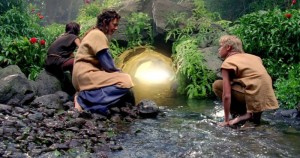
Here’s why I think Lost fans have started a civil war over “Across the Sea.” It’s because part of the audience thinks Lost is located here on the Myth-Realism continuum
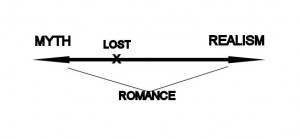
while the rest of the audience thinks Lost is located here
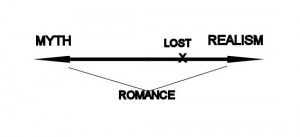
Those of us in the first group likely didn’t have a problem with “Across the Sea,” because we always thought Lost was closer to myth than to naturalism. Members of this faction focus on things like the smoke monster, the prophecies, the ghosts, the fact that the Island can magically make paraplegics walk again, etc. They focus on the fact that Lost’s characters, while vaguely realistic and fairly well-developed, also fit easily into standard romantic archetypes, such as the Wounded Healer, the Rogue-Trickster, the Wise Old Man, the Earth Mother, the Outcast-Wanderer, and the Absent-Minded Professor. They focus less on the fact that Lost’s plots can be incoherent and more on the fact that Lost’s internal symbology is coherent. After all, if Lost is an allegory, who cares if the numbers literally stand for something scientific? We know what the numbers mean. The numbers mean The Island. What else do we need to know?
Those of us in the second group were made very upset by “Across the Sea,” and it’s easy to see why. Most TV shows airing today—even the fantasy ones—operate in a relatively naturalistic universe. In naturalism, characters always have clear, understandable, relatable motivations. Cause leads directly to effect, which leads to another effect, which ultimately leads to an ending. Everything is explained in a scientific or at least pseudo-scientific way. When these things do not occur, we feel unsatisfied. We came into this story with certain expectations, and they were not met.
Honestly, I don’t think the two sides will ever come to an agreement on “Across the Sea.” One side will always have a response to the other:
REALISM-LOVERS: Everything about “Across the Sea” was bad. Everything. Everything.
MYTH-LOVERS: I dunno. I kinda liked it.
REALISM-LOVERS: What? How could you like that crap? We ask for answers and they give us a badly-animated sparkly cave? What the shit?
MYTH-LOVERS: I don’t mind the low-budget CG. I got the point. It’s just a symbol. It doesn’t have to be perfect.
REALISM-LOVERS: It looked like Marcellus Wallace’s briefcase.
MYTH-LOVERS: Maybe it was supposed to. They’re both MacGuffins. They represent whatever we want them to represent. I’m cool with that.
REALISM-LOVERS: Oh, and I suppose you thought the acting this week was top-notch, too?
MYTH-LOVERS: I thought it worked in context, yes.
REALISM-LOVERS: Are you kidding? “What’s death?” NO ONE TALKS LIKE THAT.
MYTH-LOVERS: Who says characters in a myth need to talk like real people? This isn’t a documentary.
REALISM-LOVERS: Uh-huh. Even Shakespearean actors wouldn’t have been able to save this script, the dialogue was so bad.
MYTH-LOVERS: Could you define “bad”?
REALISM-LOVERS: It was stilted. A twelve-year-old could write that shit.
MYTH-LOVERS: Well, of course it was stilted. This episode was a creation myth. That’s how myths are written.
REALISM-LOVERS: When did we ever say that Lost was supposed to be a myth? Where is my sci-fi? Who put gods in my sci-fi?
MYTH-LOVERS: Actually, the science-fiction elements weren’t put into the forefront of the show until season five, and even then they weren’t explained in a hard science-fiction way. And the god stuff was always here. Watch the first season. All fantasy-allegory, no sci-fi.
REALISM-LOVERS: Regardless! There are two episodes left! I spent six years watching this dumb show. Where are my answers?! Why did this episode only bring up more questions?! I invested time. The writers owe me satisfaction.
MYTH-LOVERS: Ah, but when did the show ever say that it was going to reveal any answers? This season’s episodes (and “Across the Sea” in particular) seem to be ABOUT the fact that the characters in the show and the writers outside the show aren’t offering answers. Maybe this show ultimately is a meta-literary allegory about how people react when no answers are given. Do you react with a leap of faith or a leap into science? Etcetera.
REALISM-LOVERS: That. Is. Bullshit. WHAT IS THE ISLAND?!
MYTH-LOVERS: It’s Magic. It’s a Magic Island. It was always there. It’s always had a protector. If it’s not protected, the world will be destroyed. That’s it. That’s all there is to it.
REALISM-LOVERS: But why?
MYTH-LOVERS: Because that’s how the story goes.
REALISM-LOVERS: But… but… but that’s not an answer!
MYTH-LOVERS: I think it is.
REALISM-LOVERS (breaking down into sobs): But what’s the Man in Black’s name?
MYTH-LOVERS: He doesn’t have a name. It’s part of the myth.
REALISM-LOVERS (curling into a fetal position): No…. No… I hate you, Lost. I hate you, I hate you, I hate you…
This debate, by the way, has happened before. Back when Gothic literature was becoming popular, it branched off into two sub-genres. One type of Gothic literature (the more “realistic” type) would, at the end, reveal what the ghosts and vampires and so on actually were. This often occurred in a Scooby-Doo-esque moment: “Aha, the ghost was never a ghost at all! It was really my evil uncle in disguise!” The other type of Gothic literature (the more “mythic” type) never offered up any explanations for its supernatural phenomena. That kind of literature was less concerned with reason and logic and more concerned with “the things humans cannot understand.” The works of Lovecraft come out of this branch of Gothic literature. Can you imagine if Lovecraft were alive today? Everyone would be screaming at him, “But what IS Cthulhu?! Where does it come from? What’s its real name? What is it made out of? You raised the questions, so where are the answers?” We in the 21st century are a rationalistic bunch.
So, is “Across the Sea” good or bad? Well, it depends on your point of view. But let’s try to play nice. If you’re a myth-lover, try to see why the realism-lovers are so up in arms over this episode. If you’re a realism-lover, try to judge the episode on its own near-mythic terms. (And if you just don’t care about this Lost Civil War, you may just laugh quietly at the rest of us from the sidelines.) Perhaps “Across the Sea” wasn’t as effective as it could have been, but let’s give Lost’s writers props for having the ambition to do something so out of the ordinary on American network TV. They tried to create something that aspired toward myth—real, religious, unfathomable myth—and they somewhat succeeded. Maybe that kind of story is not what we thought we wanted, but maybe that’s what Lost has been building up to all along.
[Which team are you on? Team Edward or Team… oh, forgive me. I wasn’t in my right mind. What I meant to say was, which team are you on? Team “Lost is a Somewhat Nonsensical Myth and That’s OK With Me” or Team “Lost is a Mostly-Realistic Science-Fiction Story and Where Are My Answers?” Or are you somewhere in between?]
[PS– No way in hell this episode was Bai Ling bad. “Across the Sea” worked as a creation myth. “Stranger in a Strange Land” didn’t work in any way under any genre heading.]
[PPS– I’ll grant you, this episode probably should not have come directly after the deaths of four major characters. But I do think it was necessary to give us this backstory and make Smokey’s motivations clearer. The question is, where else in the season could this episode fit?]
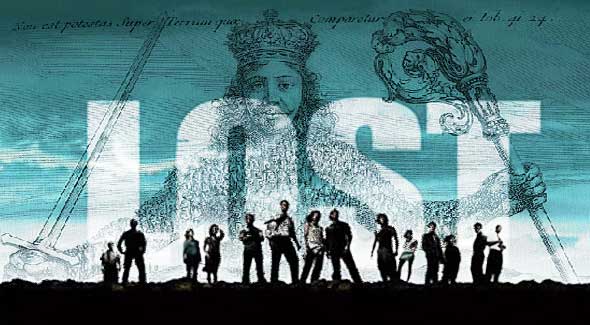
every time we overthink Lost and dismiss its flaws on the basis that it is not a reality-based show, so good acting and dialog, plausible plot points or good production values are not all that necesary, terrorism wins
(terrorism = EVIL overrated tv writers / producers)
and when I say Lost I mean any TV show, or any piece of narrative for that matters
I’ll preface this by saying I liked the episode – or I was at least ambivalent enough to enjoy it, though its deviation from form was a bit annoying (abandoning a signature style to squeeze in exposition is poor storytelling, imho). I had no idea that it was this controversial.
Two comments on your article:
1. I don’t recall Lovecraft promising answers, so I’m not so sure people would have the same reaction they are having to Lost (which I think is partly brought on by the writers’ promises).
2. “explanations for its supernatural phenomena” – I’m less interested in an explanation *for* the supernatural elements in the show than I am in an explanation *of* them: I want to know how these phenomena are important to the story, how they relate to each other and the characters, and why they are in the plot at all. Why is this a myth worth telling? I’m not sure this episode satisfied that question, but maybe that wasn’t the point of the episode.
PS I think this episode may have served well as the flashback to a smokey-centered episode.
Regarding your PPS, I wish wish wish sooooo much that this episode (which I loved, regardless) had been one of the two premiere hours of this season, ideally the first.
Think of it! You get the exposition out of the way early, so the new flash-sideways storytelling structure, which is defined in the second hour, isn’t later blatantly broken (errr… twice, I guess, but Ab Aeterno made up for it with sheer force of awesome). Also, we’re not so close to the end of things, so the lack of answers only encourages questions and mass theorizing, rather than frustration and mass disdain.
Also, soooo much of the season would have worked better. Having sympathy for the Man in Black early on? Brilliant, especially if they try to pull some kind of last minute “he’s not the bad guy” bait and switch on us. Instead of a sudden change to his entire character (arguably) from a episode-long flashback, we have that information and watch his actions unfold over the course of the season, arguing over whether he is justified since we know his motivations and, faaaaar more importantly, know -why- they are his motivations.
Also, Hurley quotes gone horribly awry could be saved! His atrocious little speech in the Adam & Eve cave with Jack, about “what if we time traveled and blah-di-blah and it’s actually Rose & Bernard like everyone assumes” might have actually been funny, since as an audience we would have been like “heh heh heh, silly Hurley, those black and white stones had a totally different meaning! jokes on you, Senor Cluck!” as opposed to the joke, you know, being on us. And also not funny.
Grrrr at missed opportunities!
(Sorry for the ridiculous tone of this post, but Lostpedia forum discussions about this episode have wearied my soul. I’ve already started pointing people there in the direction of this article, since you articulate far better than I was able to why this episode is totally likable, if not necessarily amazing. For that, I heartily thank you.)
Also, on a side note, my exclamations of “It’s just like Myst! It’s soooo much like Myst!!!” were at an all time high in this episode.
I didn’t mind the story of “Across the Sea”, but I didn’t care for the execution/direction. I’m okay with most of the show’s mythological elements; I just hope that answers provided by Darlton don’t contradict earlier episodes (ala MIB appearing as Christian off-island). When I rewatch the series, I would rather ponder unanswered mysteries than answered mysteries that don’t make sense.
Oddly, I’m somewhere in the middle — didn’t love it, didn’t hate it. I tend to fall more into the Lost-as-myth camp, and I think the decision to leave Smokey unnamed (at least on camera) is pretty genius. (And what’s better than Smokey being unnamed? The viewers who are up in arms because they haven’t revealed his name on the show, and likely never will.) No, we don’t have concrete explanations for things like the “light” — but I agree that it’s more a Macguffin. It’s the power of the human soul. A source of infinite energy. The power of love. Maybe all of them, or something else entirely. Point is, this has always been a show about relationships and evolution — anything that drives the characters toward a better understanding of themselves and each other is the point, not explaining the biological process that occurred when Jacob sent his brother into the cave.
I had the privilege of attending the “Lost: Live” celebration last week where they showed tomorrow night’s episode in advance. It might actually help to talk more seriously about “Across the Sea” this Wednesday, after the next ep has aired… because there actually ARE scenes and dialogue that help clarify what happened in AtS in a more realistic manner and shed some new light on things. (Not to mention that despite a few logic gaps and character changes, it’s a pretty fantastic episode, one of the best of the season and a great prelude to the finale)
I agreed with everything you said until your very last point. I thought the episode was exactly in the right place. The show was never going to go straight back to the gang on the beach immediately after killing off half of them, keeping us waiting has always been Lost’s style. Personally, I was predicting an entirely Ben/Richard/Miles episode so I was actually pretty excited when it became clear who it was.
And I genuinely think it was good placement for the story too. Had it been in an earlier episode we wouldn’t have had the weeks of speculation of “is MIB really evil, or is it possible everything he says is true and Jacob’s really our bad guy?” which only really seemed to get solved last week when he outright tried to kill the Losties. The added mystery to his motivations (and, to a lesser extent, the continuing one about his name) was what, for me, made him such a compelling character, and it seemed right that we only got his backstory after those intentions became apparent.
Plus; having an entirely flashback-ed episode with none of the main characters three weeks before the show ends? If anything it showed that the show can still surprise us all, right to the end.
You are a genius. Your myth/ realism diagrams and the ensuing dialogue between the lovers and the haters were spot on. I couldn’t have said it better, and now I don’t have to… I’ll just direct people to your blog. Thanks!
I loved the episode. And I want answers, most of which I have gotten.
Will they get off the island? Some did, some didn’t.
Why they crashed on the island? Jacob brought them to the island.
What is the island? Faraday, and the show has said it has strong electromagnetic properties. Like the radiation’s effect on Bruce Banner and the Fantastic Four, we have to except that this natural phenomena can give people super powers, and can give an island the ability to creat and MIB and Jacob, and ghost’s.
What is the smoke monster? MIB.
What are the Ghost’s? explained this season.
Why are the others there, same reason the Losties are there, but are followers of MIB or Jacob.
So most of the answers people HAD have been answered!!!
I’m team Lost-as-myth. Scientific explanations are alright, but I’m fine with stuff not necessarily being 100% explained.
I’m team Lost-as-good-storytelling, and I have to agree with Kimbo: “abandoning a signature style to squeeze in exposition is poor storytelling”.
Do you really think this episode abandoned Lost’s signature style? It was a flashback revealing the heretofore unknown origins of some characters stuck on the island. Sounds pretty familiar to me.
I think it was the end of “The Constant” that clued me in to the fact that Lost’s writers are not aiming for realism. Because the whole “I need to make a phone call or my head will explode” thing didn’t make any scientific sense. That upset me at first, but now I’ve accepted the fact that this show’s only ever going to make sense emotionally, not logically.
Personally the jury is out for me until the next episode; if subsequent episodes make sense in the ‘light’ of this one (hahahha) then I’ll be satisfied. But I agree that this episode would have fitted in much better at the start of this series.
The show’s style is typically an alternation between two stories, drawing themes from one into the other or contrasting between the two. That style has been the essential core of the show since Season 1 and is part of what drew me into watching. This season they deviated to a single story (“extended flashback”) style whenever they needed to squeeze in background exposition. They were good, but they don’t fit.
I have to reiterate Annie’s comment above and laud your myth vs. realism charts – fantastic work.
Also, I sort of love how each of the two, while representing each segment of the fanbase, also sort of represent Jacob and MIB, respectively. Jacob is the ‘X’ on the first chart, leaning to myth, accepting the unexplainable, deferring to the myth-teller as simply telling like it is and being okay with that. MIB leans toward realism, questioning explanations and surroundings, and investigating the unknown.
Conveniently enough, the picture you included (this was a magnificently illustrated post, brava) of Jacob, MIB and Mother in front of the Source perfectly displays this schism: MIB is inquisitively peering into the cave, while Jacob is attentive to Mother and has already accepted what he has been told.
This also might be one of the best pieces of evidence that the writers want us to side with Jacob – they are, essentially, positioning _themselves_ in a Mother/Jacob role, saying “accept what we tell you, this is a story, and this is how things are in that story, do not question it, as questions lead to more questions and eventually blunt force trauma.”
Definitely liked this ep, and even more so in retrospect after reading this article (Ah! It’s a creation myth! Of course!). However, the ONE thing I can’t forgive it for is the cut to Season 1 Jack/Kate/Locke finding Adam and Eve in the cave. Give your audience some credit, writers! Besides, only the die-hards are left at this point, anyway.
I liked Across the Sea. It is the second best episode this season. Many people hated it because they had high expectations.